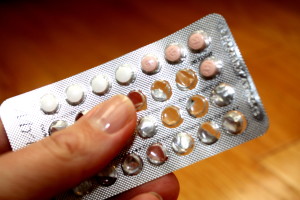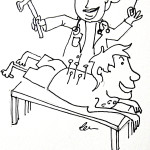 There are many reasons to start using the birth control pill. Some of them are not-so-great: dealing with painful menstruation, acne, irregular periods or ovarian cysts – there are other, natural ways to manage these health concerns with fewer side effects and health risks! Some reasons for going back on the pill after a few-year hiatus are pretty awesome, like starting a new relationship. In other words, using the birth control pill for what it was designed for: birth control.
There are many reasons to start using the birth control pill. Some of them are not-so-great: dealing with painful menstruation, acne, irregular periods or ovarian cysts – there are other, natural ways to manage these health concerns with fewer side effects and health risks! Some reasons for going back on the pill after a few-year hiatus are pretty awesome, like starting a new relationship. In other words, using the birth control pill for what it was designed for: birth control.
I’m surprised to find that I’m hesitant to admit it publicly, but I’ve decided to go back on The Pill after considering various contraception methods; in natural health circles the Birth Control Pill is often seen as an unnecessary evil. However, Tori Hudson author of the Women’s Encyclopedia of Natural Medicine, has called oral contraceptives a “truly revolutionary option for women” and points out that the dose of estrogen and progesterone in the pill today is much lower than it was when it first arrived on the market. That being said, it’s important to talk to a healthcare provider to go over birth control methods and decide which one is right for you. Alternate options include physical barriers, such as condoms and diaphragms, cycle charting, apps, such as the Lady Comp, or IUDs, to name a few. Each method has its associated pros, cons, costs and health risks. Finding a safe and effective form of contraception involves you and your healthcare team.
For me, The Pill seems to be the best choice at the moment for various reasons, which I won’t get into here. However, the idea of ingesting synthetic hormones again, after having carefully brought my cycles back to a perfect, painless and PMS-free 28-day rotation and after having cleared up my hormonal acne, made me nervous. So, I did what all trained naturopathic doctors do; I used my naturopathic know-how to tailor an optimal Synthetic Hormonal Experience for myself. Going back on the pill needn’t come with undesirable side effects; maybe it could be a positive experience. Here are some tips:
Decide if oral contraception is your best method
Selecting the method of birth control that best fits your lifestyle, budget, health history and personal style requires an in-depth conversation between you and your healthcare provider. He or she should have a detailed conversation with you about your expectations, goals, sexual and health history as well as family history. Selecting the right method may also require some trial and error.
Consider the associated risks
A history of smoking and blood clots could put you at risk for dangerous side effects. The birth control pill is also associated with an increased risk of certain cancers. (And a decreased risk of uterine and ovarian cancers in the general, healthy population). Your personal risk profile will involve your personal health history and family history as well as lifestyle factors such as smoking. Talk to your healthcare provider.
Pick the right pill for you
Based on my history of suboptimal glucose control, hormonal acne and irregular periods, I knew that I needed a pill with the lowest dose of estrogen possible. My hormonal profile tends towards estrogen dominant and progesterone deficient so I chose a low-dose estrogen and high-dose progestin pill. The form of progestin used has zero androgen (male hormone) activity, therefore it is unlikely to contribute to acne. It also contains a diuretic, which combats my tendency to hormone-related water-retention. The combination of my knowledge of my personal hormonal profile and ability to research hormone combinations in various pills led me to choose a product that offered positive side-effects rather than negative ones. Since being on the pill again, I’ve experienced weight loss, rather than gain, lighter, more regular cycles and clearer skin. It’s worth repeating that these side-effects were not my motivation for going on the pill. If you are using the pill for symptom-management and hormone-balancing rather than birth control, consider trying natural methods instead.
Be prepared for trial and error-ing as hormone levels fluctuate
Give your new pill a 3-month trial period. During this period, be prepared for temporary side effects such as mood changes, skin outbreaks, temporary weight gain or water retention and break-through bleeding. Other common side effects of synthetic hormones are nausea and headaches. Allow 3 months for things to stabilize and, if still experiencing symptoms, talk to your healthcare provider about trying a new pill or birth control method.
Make sure to supplement to account for vitamin and mineral deficiencies
Oral contraceptives can deplete several key vitamins and minerals. The B vitamins folate, B6 and vitamin B12 are most notably affected. Deficiencies in these vitamins could lead to fatigue and depression or even neurological impairment. Magnesium, zinc and vitamin C levels are also affected, which can have an impact on the immune system. These minerals are important in a variety of metabolic processes. Since starting the pill again, I am diligent about taking my B-complex and magnesium supplements. Make sure you talk to your naturopathic doctor or other healthcare provider about choosing a quality supplement and dosing correctly, to make sure you are putting back in your body the nutrients that your pill may be depleting.
Hormone balance when coming off the pill
If you reach a happy medium with your pill, then congratulations! But, you ask, what happens if I decide to get pregnant or switch to another method of birth control? Work with a naturopathic doctor or your trusted healthcare provider to balance hormones with herbal or nutritional supplements when coming off of the pill. Herbs such as vitex, help regulate hormones and prevent side effects from the withdrawal of synthetic hormones.
For more information on balancing hormones and optimizing fertility, contact me.
This article is not a substitute for medical advice.





